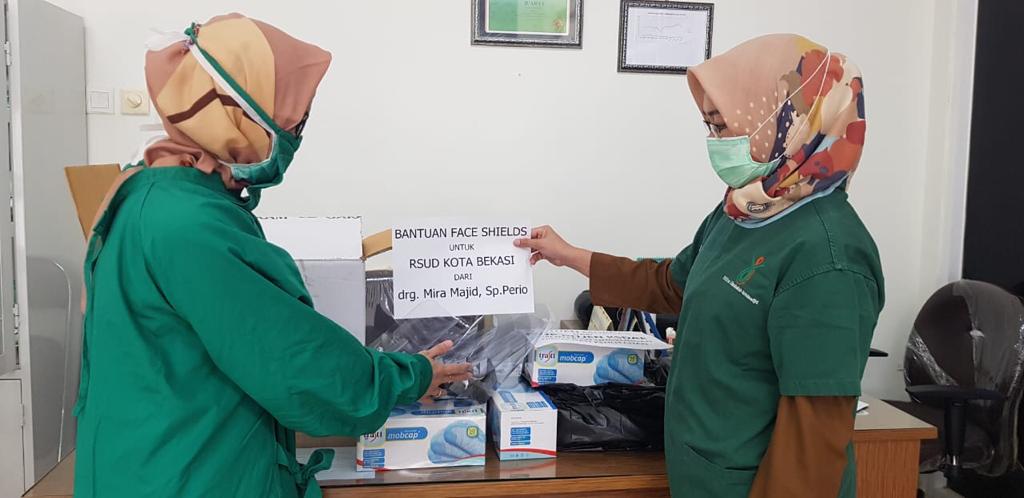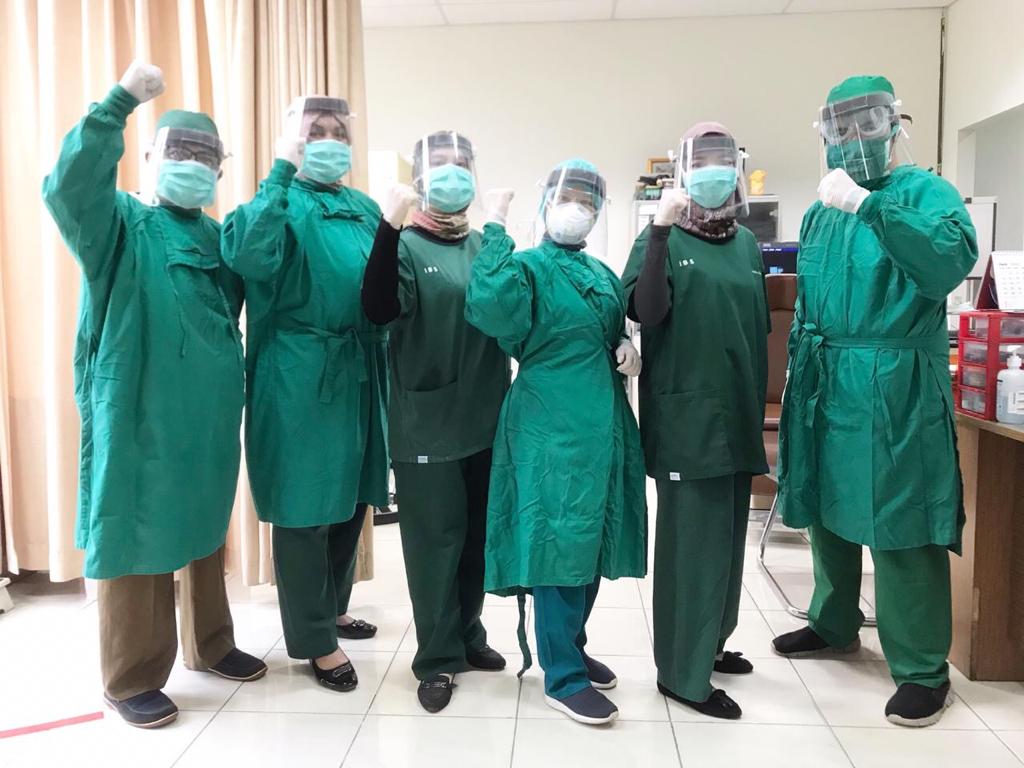Many are taking the initiative to establish movements to help prevent the spread of the Corona Virus, by producing medical protection equipment. These initiatives arose as moral movements that receive no government aid.
By May Rahmadi
JAKARTA. Solidarity movements are on the rise in handling the spread of the Corona virus disease, or better known as Covid-19, in line with the rise in infection cases in Indonesia. By April 15, 2020, there were already 4,839 individuals positively infected, 426 have recovered, while 459 lost their life.
The rise of these solidarity movements is for most part, due to the perceived slowness of the government in responding to the pandemic. In the first two months when Covid-19 cases were identified in Indonesia, the government failed to come out with any meaningful policy to prevent the spread of the virus.
This then prompted individuals or groups of people in many regions to voluntarily establish solidarity movements. They acted on their own, without any assistance from the government, and formed initiatives to fight the spread of the deadly virus in the country.
These initiatives took on various forms, some raised funds, others distributed medical and health protective equipment such as masks and face shields.
Faceshields for health workers
Mira Madjid, a dentist in Jakarta, was one of those individuals who felt compelled to make face shields for health workers. The dentist who usually has a practices at a private clinic in Kelapa Gading, North Jakarta, is now producing hundreds of such face shields in a day that are then distributed to health workers who needed it.
Madjid distributed the face shields to village-level health clinics, known as Puskemas, in Jakarta as well as to a number of hospitals outside of Jakarta. “The highest dispatch was for 1,000 units within five days, for 15 hospitals and puskesmas,” Madjid said on Saturday (4/4.)
Her activity began in mid-March after medical doctors, including dentists like herself, experienced difficulties in obtaining face shields when the corona virus outbreak began in Jakarta.
One of Madjid’s friends, who was a doctor, proposed that people could make their own face protection equipment and subsequently came out with a tutorial video on how to make them.
At around the same time, the Indonesian Association of Dentists came out with a call for the closure of dental clinics on March 20, 2020 as a safety precaution in the face of the Covid-19 outbreak. The closure of clinics then provided Madjid with plenty of time at home and allowed her ample time to make the face shields.
“When I halted my practice and had ample time at home, I have started to be more active,“ she explained. “At the time people were starting to panic because of the corona virus, but there was yet any serious measures taken in handling the disease in Jakarta.“
Madjid said that with the help of an assistant and her children at home, she once made 400 face shields in a day, or double what she usually could produce each day.
To encourage her friends – especially those in her profession – to join the solidarity, Madjid often uploaded photos of her activities in the social media. It was also through the social media that she offered her face shields for free to any health worker who needed it.
Madjid said that orders for her face shield began to flow, including from out of town, as many health workers outside of Jakarta began to have to deal with many People Under Monitoring and Patients Under Supervision but unfortunately they were not equipped with proper protective equipment.
Since that time, Madjid began to grow her movement. She sought volunteers outside Jakarta who could help distribute her face shields to health workers in the regions that are in need.
There were now already a number of such volunteers in a number of large cities in Kalimantan, Sulawesi, and Papua. Madjid said that it was quite easy to make the face shields and only a limited amount of raw materials such as mica sheets and foam, were needed. “There are still enough materials at home. Maybe enough for some 3,000 units,“ she said.
Madjid stressed that all her activities received no assistance from the government or any organizations, Although at the beginning she financed her activities herself, she then began to receive individual contributions in the form of manpower, money and materials.
“It is like a movement. We are not representing any organization. No one is using this as a stage for personal interest. This is just like a moral movement,“ she said. “It is better than just cowering at home.“
She is calling on anyone that wants to seriously engage in this movement, to become volunteers, especially outside of Jakarta and said that she could be reached through her Instagram account, @miramadjid.

Face masks for communities
Besides the provision of face shield there were also many movements focused on the distribution of face masks. If face shield is one protective equipment for use by health staff, the general public on the other hand, especially those who are forced to remain outside to work, such as online taxi and motorcycle drivers, and hawkers, rely on face masks.
The Bekasi Solidarity Against Covid-19 is one of several movements that focuses on distributing face masks to community members who are in need. Sasmito Madrim, the initiator of this movement, claimed that he had already distributed more than 2,000 masks for people in Bekasi district and Bekasi City.
A journalist, Madrim felt compelled to form the solidarity movement because as a field worker, he is fully aware that he is more vulnerable to infection. Masks which are essential in protecting oneself, were starting to disappear from the market very quicly by early March because people were rushing to buy and there were also many hoarders.
Madrim then invited a number of friends to help support his idea to form the movement and fortunately for him, his call received positive responses. One of his friends who supported the idea, just happened to own a garment businesses which had plenty of textile waste that could be used to make the masks.
His movement also worked together with a journalist organization which at the time was actively raising fund and efforts to produce masks, for distribution within the organisation and journalists who are covering and reporting reporting on Covid-19.
Three coordinators worked to distribute the masks, among others for communities in in Griya Tambun Selatan and Cibitung, both in Bekasi district, and for communities in Bekasi Jaya, Duren Jaya, Stasiun Bekasi, Pondok Ungu Permai, Bintara Kranji, Kaliabang Tengah, Mustika Jaya and Karang Taruna Bekasi Jaya, all in Bekasi City.
“The masks are distributed directly from house to house under the coordination of the local head of neighborhood, on the streets, while maintaining the safe distance,“ Madrim said.
The movement now aims at producing 20,000 masks by end of April. They estimate that it would costs Rp 80 million and they are trying to raise this amount through the crowd funding site Kitabisa.
The membership of this movement grew with time, as people increasingly realized the importance to act and produce masks to battle the Covid-19 and joined Madrim and his friends. The movement now sees more than 50 members, some of them are garment entrepreneurs who offer to provide the materials to make masks.
Madrim explained that the initiative to distribute masks came following the scarcity of the masks in Bekasi.
Bambang Wibowo, Director General for Health Services at the Ministry of Health said that medical protective equipment were not only needed by doctors and health workers but also by the population at large and therefore there needed to be a priority scale for them.
“The use of proper medical protective equipment can function as an obstruction to infectious materials such as viruses and bacteria in reaching the skin, nose or the eye’s mucous membrane for health workers or patients,“ Wibowo told a press conference at the BNPB Building in Jakarta on Thursday (9/4.)
There were a number of different personal and medical protective equipment, including face shields, masks, aprons, shoe protections and head protections. While masks, used to protect the mouth and nose, also have a number of variants.
People are urged to use cloth masks while the N95 masks and surgical masks are prioritized for doctors and health workers. “Cloth masks are not recommended for health workers, it would be better used by the people in general,“ Wibowo said.
Wibowo, however, reminded people that the use of personal and health protective equipment should also be accompanied by other means of control against infection such as washing hands, and coughing or sneezing in an ethical manner. Ekuatorial.
